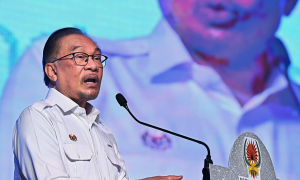Naomi Osaka’s withdrawal from the FFT is raising important questions on whether athletes should be expected to face the media post-match.
Current world number two, and four-time Grand Slam winner Naomi Osaka withdrew from the French Open on Monday, May 31, citing mental health reasons. In response to her withdrawal, the French Tennis Federation (FFT) released a statement that included lightly veiled threats about further suspension of the athlete should she refuse her media obligations.
Osaka had announced the previous week – after an intense and gruelling match – that she could not attend the usual post-match press meeting during the tournament, in order to protect her mental and emotional wellbeing. Fully acknowledging the likelihood of being fined for her decision, Osaka requested that her penalty amount go toward a mental health charity.
“I’ve often felt that people have no regard for athletes [sic] mental health and this rings very true whenever I see a press conference or partake in one,” Osaka shared on her Twitter handle. “I’ve watched many clips of athletes breaking down after a loss in a press room and I know you have as well. I believe the whole situation is kicking a person while they’re down and I don’t understand the reasoning behind it.”
Rather than visit an alternative option that would protect the athlete from further mental stress, the FFT went ahead and fined Osaka, demanding $15,000 as a penalty for failing to attend the press conference after her win over Romania’s Patricia Tig on Sunday, May 30.
Also jumping on the rather worrying bandwagon, all four Grand Slam tournaments have since released a joint statement with further threats to suspend Osaka from future tournaments should she continue to “ignore her media obligations.”
“The mental health of players competing in our tournaments and on the Tours is of the utmost importance to the Grand Slams,” they said in the joint statement, before almost immediately contradicting themselves. “As a sport there is nothing more important than ensuring no player has an unfair advantage over another, which unfortunately is the case in this situation if one player refuses to dedicate time to participate in media commitments while the others all honour their commitments.”
Those who support Osaka’s position find it disconcerting to know that post-match press conferences aren’t optional for athletes; especially those who might be struggling with public speaking, or suffering from various performance anxieties.
Faced with the option of being forced to face the media much to the detriment of her mental health, or risk further fines and suspensions, Osaka bravely withdrew from the French Open entirely.
“The truth is that I have suffered long bouts of depression since the U.S. Open in 2018 and I have had a really hard time coping with that,” Osaka shared in an announcement of her withdrawal on Monday.
Osaka created history when she beat her idol Serena Williams in straight sets to win the 2018 U.S. Open and claim her first Grand Slam title. Tragically, her victory was severely tainted by a stadium full of furious spectators booing and jeering at Osaka’s win over Williams.
“So here in Paris I was already feeling vulnerable and anxious so I thought it was better to exercise self-care and skip the press conferences,” Osaka wrote. “I’m gonna take some time away from the court now, but when the time is right I really want to work with the Tour to discuss ways we can make things better for the players, press and fans.”
Fans, fellow athletes, and celebrities from around the globe are standing in solidarity with Osaka, while expressing support on her socials. It’s encouraging to see a positive shift in public perception towards mental health struggles, however, it’s also clear to see that sports institutions need better structures in place to protect athletes both physically and mentally.
After so much backlash, the FFT’s poor response to Osaka’s withdrawal did not do them any favours. Speaking to the press in both English and French on Monday, FFT President Gilles Moretton read a four-sentence prepared statement that was subsequently published to the Roland-Garros website.
“First and foremost, we are sorry and sad for Naomi Osaka,” said Moretton. “The outcome of Naomi withdrawing from Roland-Garros is unfortunate. We wish her the best and the quickest possible recovery, and we look forward to having Naomi at our Tournament next year.
“As all the Grand Slams, the WTA, the ATP, and the ITF, we remain very committed to all athletes’ well-being and to continually improving every aspect of players’ experience in our Tournament, including with the Media, like we have always strived to do.”
Moretton then exited without taking any questions from the press.
The Grand Slams statements claim that they wish to avoid giving one player certain advantage over the others. However, forcing their players into stressful situations like media press briefings after matches that require both extreme physical and mental focus can be detrimental to some. Perhaps the requirement for athletes to face the media post-match needs to be revisited, and hopefully altered for the better.
"ExpatGo welcomes and encourages comments, input, and divergent opinions. However, we kindly request that you use suitable language in your comments, and refrain from any sort of personal attack, hate speech, or disparaging rhetoric. Comments not in line with this are subject to removal from the site. "




















